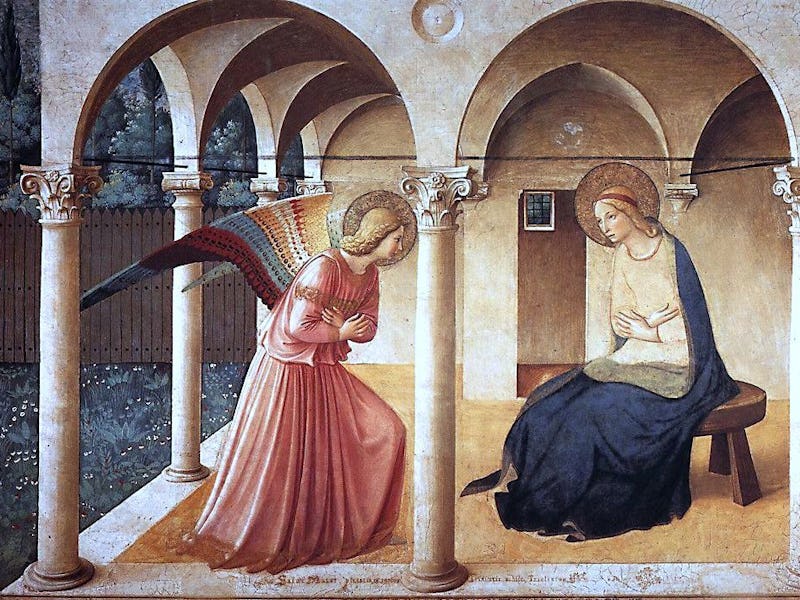Climate Change and the Rise of the Virgin Birth
Single motherhood could become a lot more commonplace if global warming whittles down animal populations.

The biological world was graced with a Bible-worthy miracle in early July when a virgin female shark — one that hadn’t hooked up with males in years — gave birth to three pups in an Australian aquarium. Though the event perplexed the sharks keepers — was Leonie, the virgin shark, hooking up on the DL? — scientists around the world were more concerned: This feat of biological magic was a lonely shark’s last-ditch effort to pass on her genes. Forced into celibacy by artificial means, there was no other way for her to leave her mark on evolutionary history than to undergo the scientifically improbable process known as parthenogenesis. What’s going to happen if climate change forces sharks to be single by default?
Sharks are lucky they’re genetically flexible, George Burgess, the program director for the Florida Program for Shark Research, tells Inverse. Their ability to induce parthenogenesis, which he calls a “last-gasp approach” at reproducing, helps them contend with the sexually Draconian environments in which they’re often held captive. “They’re being kept without a mate,” he says, explaining that the same process has also been observed in captive lizards and insects. “It’s an evolutionary corner.” But there’s evidence, like this 2012 study on virgin births in wild sawtooth fish populations in Current Biology, that this phenomenon also happens outside of the aquarium. If climate change ends up constructing the biological dead ends humans have created artificially, species that are capable of virgin births could have the upper hand.
When the underwater dating scene gets desperate, some female leopard sharks will eschew sex altogether and reproduce on their own.
Warren Booth, Ph.D., a molecular ecologist and parthenogenesis expert at the University of Tulsa, has also pondered the impending age of the virgin birth. “We are just at the tip of the iceberg in regards to studies of parthenogenesis in vertebrates,” he said in an e-mail to Inverse, explaining that there are two climate change-related scenarios that could lead to a future where such miracles become more commonplace.
The first is one where something in the environment — say, a sudden spike in temperature or a change in the food supply — drives a female to take on motherhood solo. It’s a plausible scenario, but Booth is inclined to throw it out because so many virgin animal births take place in captivity, where conditions are optimized.
He leans toward a hypothesis in which virgin motherhood is controlled by genetics. If climate change led to a subset of the population dying, he explains, then it’s likely that more sharks carrying the virgin birth gene (or genes) would mate, increasing the number of sharks that carry two copies of this gene. (Quick biology refresher here: Very often in genetics, two copies of a gene one from mom and one from dad are required for a trait to take effect.) The genetic basis for parthenogenesis hasn’t been established yet, but a small handful of studies, including a 1970s paper that Booth mentions, linking virgin births and chicken families, hint that it might be the case. Offspring born to virgin mothers have also been known to undergo parthenogenesis themselves, Burgess adds, further corroborating the idea that genetics are the underlying cause of these biological miracles.
Ultimately, Burgess explains, the scenario the virgin shark forces us to imagine is a lesson in survival: Throughout evolutionary history, the species that have made it have always been the ones that could adapt, finding ways — however bizarre — to keep their bloodlines going. Parthenogenesis is just another mechanism that some species have developed as a way to stay flexible as the world around them changes. Burgess and Booth are both animal specialists, but the same lessons about diversity apply to us. Individuals who have adaptability built into their genes, like the virgin sharks, will have more of a fighting chance, especially as the environment around us changes because of global warming. “Humans have better flexibility,” he jokes. “We can make air conditioning.”
Still, he reiterates, it’s important to remember that parthenogenesis is an act of desperation and not a long-term strategy for survival. In the long run, having more virgin births isn’t going to be good for any species: With every batch of fatherless individuals, genetic diversity — that is, the guarantee that there are enough genetic anomalies in a species to withstand any sort of storm — gets whittled down because the offspring are essentially clones of their mothers. “Increased parthenogenesis would result in a situation with less gene diversity,” Burgess says. “Populations would be more vulnerable down the line.”
At the moment, it isn’t clear whether ongoing global warming is causing parthenogenesis to happen more often in the wild. Its rarity, naturally, makes it an especially difficult thing to study. But there’s no question that climate change is modifying natural habitats, and there’s little doubt wild animal populations are scrambling to contend with those changes. Burgess doesn’t think it’s unlikely that it’s happening. “Over the next 100 years, we’ll probably be seeing it a lot more than we’re seeing now,” Burgess speculates. “We’re on the cusp of this phenomenon.”